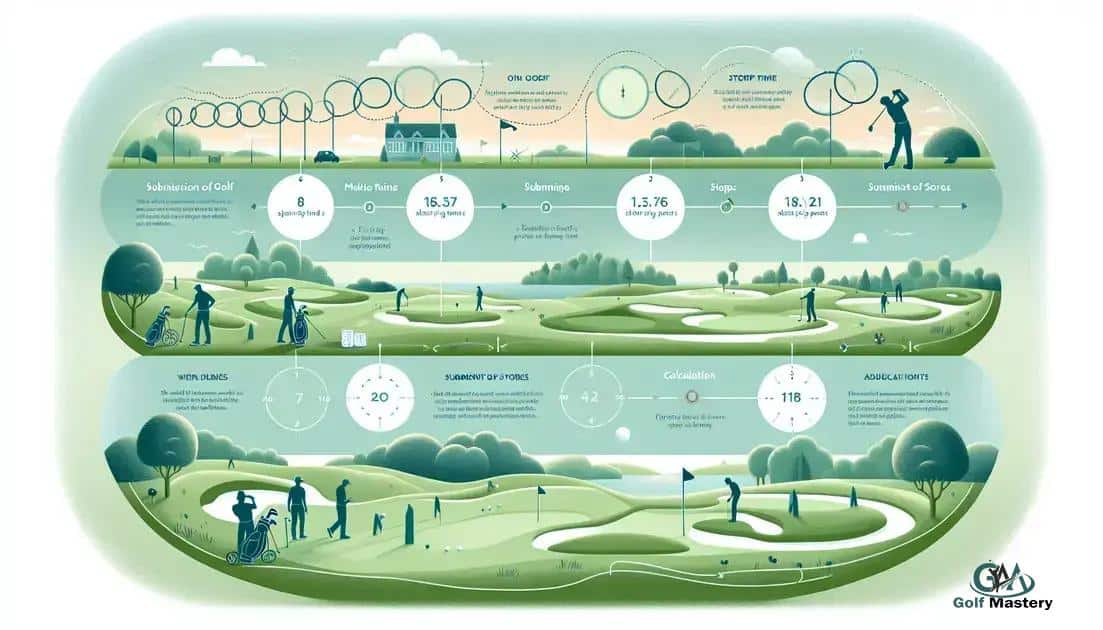How long to get a golf handicap can affect your game. Learn the steps involved in this process to optimize your golfing experience.
A golf handicap is a numerical measure of a golfer’s potential ability, allowing fair competition among players of varying skill levels. To obtain a handicap, you must play at least five rounds of golf, keep accurate records, and be a member of a recognized golf club or association.
Curious about how long to get a golf handicap? This essential aspect of the game helps you gauge your skill level and compete fairly. In this article, we’ll discuss the process involved, the factors that influence the time it takes, and provide tips for those new to the golfing world. Whether you’re a beginner or seasoned player, understanding your handicap is crucial for improvement and enjoyment.
Understanding Golf Handicaps
A golf handicap is a numerical measure of a golfer’s potential ability, allowing players of different skill levels to compete on a fair basis. It is calculated using a golfer’s recent scores and the difficulty of the courses played. Handicaps help to level the playing field, ensuring that golfers of varying skills can enjoy the game together.
How Handicaps are Calculated
The calculation involves your best scores and the course rating, a number that reflects the difficulty of a golf course. The formula generally involves taking an average of your best scores, adjusting it according to the course rating, and applying a specific multiplier to reach your final handicap index.
Why Handicaps Matter
Handicaps help to measure a player’s improvement over time. As you play more and improve your skills, your handicap will adjust accordingly. This allows golfers to see their progress and strive for a better score.
Types of Handicaps
There are two main types of handicaps: pre-adjusted and post-adjusted. Pre-adjusted handicaps are based purely on your scores, while post-adjusted handicaps consider the conditions of play, allowing for a more accurate representation of a golfer’s capabilities.
The Importance of Keeping Accurate Records
To ensure a fair and accurate handicap, golfers must maintain precise records of their scores. This includes noting the course rating and slope each time they play. Consistency in keeping these records plays a vital role in the integrity of the handicap system.
Understanding how golf handicaps work not only enhances your appreciation of the game but also enables you to compete more effectively and fairly with fellow golfers.
Factors Affecting Handicap Time
Several factors can influence how long it takes to obtain a golf handicap. Understanding these can help you manage your expectations throughout the process.
Number of Rounds Played
The more rounds you play, the quicker you can establish a handicap. Most golf associations require a minimum number of rounds, usually around five, to generate an accurate handicap index.
Your Skill Level
Your current skill level directly impacts your handicap. If you consistently play well, your handicap will stabilize faster as your scores reflect your playing ability accurately.
Course Difficulty
The difficulty rating of the courses you play on affects your handicap calculation. A harder course may yield a higher score, which can influence how quickly your average stabilizes.
Data Submission Frequency
Submitting scores promptly and accurately aids in quicker handicap establishment. Ensure to record and submit your scores as soon as possible after each round.
Golf Association Regulations
Different golf associations have unique regulations regarding how handicaps are calculated and established. Familiarize yourself with these rules, as they can determine the speed at which you get your official handicap.
By understanding these factors, you can better navigate the process of obtaining a golf handicap and enjoy the sport more fully.
Steps to Obtain a Golf Handicap
Obtaining a golf handicap involves a few straightforward steps. Following these steps will help you get your official handicap quickly and correctly.
Step 1: Join a Golf Club or Association
You need to be a member of a recognized golf club or association that can issue a handicap. This organization will provide guidelines and keep track of your scores.
Step 2: Play at Least Five Rounds
To calculate your handicap, most associations require you to play and record at least five rounds of golf. These rounds can be played on different courses.
Step 3: Record Your Scores
Keep detailed records of your scores for each round played, including the course rating and slope. Ensure that your records are accurate for a proper handicap assessment.
Step 4: Submit Your Scores
After playing your rounds, submit your scores to your golf club or association. Most organizations have deadlines for score submissions.
Step 5: Receive Your Handicap Index
Once your scores are submitted, the association will calculate your handicap index based on your performance. This index will be provided to you and regularly updated as you play more rounds.
Following these steps will ensure you obtain your golf handicap efficiently and enjoy your golfing experience more fully.
Common Misconceptions About Golf Handicaps
There are many misconceptions about golf handicaps that can confuse new players. Let’s clear up some of the most common myths.
Misconception 1: Handicaps are Only for Beginners
Many believe that only beginners need a handicap. In reality, all golfers, regardless of skill level, can benefit from having a handicap to fairly compete against others.
Misconception 2: A Lower Handicap Means You Are a Better Golfer
A lower handicap does indicate better performance, but it does not mean you are an expert golfer. It simply reflects your recent scores compared to the average player.
Misconception 3: Handicaps Are Fixed
Some think that once a handicap is established, it stays the same. Handicaps are dynamic; they change as you play more rounds and improve your skills.
Misconception 4: Playing in Different Conditions Affects Your Handicap
While different course conditions can influence your scores, your handicap is calculated based on standardized metrics. Therefore, it will reflect your overall skill level rather than just one day’s performance.
Misconception 5: Handicaps Are Not Important
Some golfers may feel that having a handicap is unnecessary. However, it provides a fair playing field and helps track your improvement over time, which can enhance your overall golfing experience.
By debunking these misconceptions, you can better understand the true purpose and value of having a golf handicap.
Tips for New Golfers on Handicaps
For new golfers, understanding and managing your golf handicap can seem overwhelming. Here are some valuable tips to help you navigate this process more easily.
Tip 1: Play Consistently
To establish an accurate handicap, try to play regularly. Aim for at least five rounds of golf to get started. Consistency will help provide a better picture of your skills.
Tip 2: Keep Detailed Records
Always maintain a record of your scores, including the course rating and slope. Accurate records are crucial for calculating your handicap correctly.
Tip 3: Understand the Calculation
Familiarize yourself with how handicaps are calculated. This knowledge will help you understand how your performance affects your handicap and how to improve it.
Tip 4: Don’t Be Discouraged
Remember that your handicap is just a number. It reflects your potential and helps level the playing field, but it should not define your enjoyment of the game. Improvement takes time!
Tip 5: Seek Guidance
If you’re unsure about the process or how to track your scores, ask for help from more experienced players or club staff. They can provide valuable insights and support.
By following these tips, new golfers can better manage their handicaps and enjoy their time on the course.
In Summary: Understanding Your Golf Handicap
Obtaining a golf handicap is an essential part of enjoying the game, as it allows golfers of varying skill levels to compete fairly. By understanding the process and factors involved, new golfers can navigate the steps to establish their handicaps effectively.
Explore the common misconceptions and tips shared in this guide to enhance your golfing experience. Remember, consistency in playing and recording scores is key to developing an accurate handicap. With patience and practice, your handicap will reflect your true golfing abilities.
Whether you’re just getting started or looking to refine your skills, embracing the handicap system will not only help you measure your progress but also ensure more enjoyable and competitive rounds of golf.
FAQ – Frequently Asked Questions About Golf Handicaps
What is a golf handicap?
A golf handicap is a number that represents a golfer’s potential ability, enabling players of different skill levels to compete fairly.
How long does it take to get a golf handicap?
Typically, it takes at least five rounds of golf, along with accurate scorekeeping, to establish an official golf handicap.
Do I need to join a golf club to get a handicap?
Yes, you usually need to be a member of a recognized golf club or association that can issue an official handicap.
Can my handicap change over time?
Yes, your handicap can change based on your scores and performance; it is updated regularly to reflect your current skill level.
What factors affect my golf handicap?
Factors include the number of rounds played, your skill level, course difficulty, and the frequency of score submissions.
Are there misconceptions about golf handicaps?
Yes, common misconceptions include the belief that handicaps are only for beginners or that a lower handicap always means a better golfer.






Leave a Reply